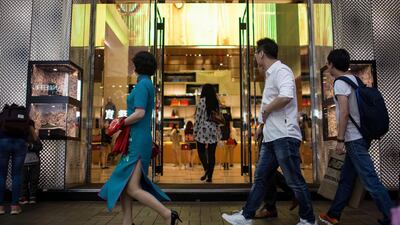For Europe’s luxury giants, it’s a nice dilemma to have: what to do with all that cash.
French companies LVMH, Kering and Hermes International, along with Switzerland’s Richemont, had collectively amassed a €17.4 billion (Dh77.01bn) cash pile by the end of 2017. More is rolling in, as sales boom in China and a new generation of designers creates buzz with younger shoppers. Just this week LVMH reported that first-quarter organic sales surged a greater-than-expected 13 per cent.
“They can’t park this cash; they have to do something with it," Ashok Som, co-director of a luxury management programme run by France’s Essec Business School and Italy’s SDA Bocconi School of Management, told Bloomberg. Something - but what?
Hermes is paying a special dividend to shareholders totalling about €528 million, while Richemont is spending about €2.7bn to take control of online retailer Yoox Net-a-Porter. Yet those transactions will make relatively small dents in the companies’ cash piles.
Cosmetics companies are also benefiting from strong appetite for skincare products like anti-ageing treatments, after riding a make-up boom in the past few years, spurred by young Chinese consumers seeking to look good on social media.
High-end cosmetics and treatments have proved particularly popular, and L'Oreal said this trend had accelerated at the start of 2018, driven largely by Chinese customers. Its luxury brands also include Yves Saint Laurent and Kiehl's.
"The luxury market is really flying right now," chairman and chief executive Jean-Paul Agon told Reuters.
Agon said Chinese appetite for cosmetics all along the price scale was robust.
"This appetite for beauty products could really be sustainable for a while," he said.
So far, trade tensions between China and the United States have shown little sign of affecting consumer sentiment.
L'Oreal, the world's biggest cosmetics firm, said group sales grew 6.8 per cent from a year earlier on a like-for-like basis, which removes the effect of currency swings and acquisitions or disposals.
That beat expectations for a 5.6 per cent rise, and marked the strongest pace of quarterly growth in eight years.
L'Oreal, which has been bumping up its digital business, said online sales were growing fast and accounted for 8.8 per cent of all revenues in the first quarter.
_______________
Read more:
World's biggest luxury firm LVMH to boost green credentials
Meet Virgil Abloh, the man designing your next Louis Vuitton
_______________
The company still faces hurdles, however, including from a strong euro that affects revenues made in other currencies and converted back.
On a reported basis, L'Oreal sales were down 1 per cent in the first quarter at €6.78bn, reflecting the hit from foreign exchange effects.
Splashing out on acquisitions is an option for luxury juggernauts, but not many attractive targets are available, Bloomberg said. The big luxury groups would love to get their hands on closely held Chanel, for example, but its owners show no interest in selling. LVMH was firmly rebuffed when it tried to mount a stealth takeover of Hermes. Over the past year, the big groups passed on chances to acquire watchmaker Breitling, shoe company Jimmy Choo and Jeanne Lanvin, France’s oldest couture house.
Outside-the-box acquisitions haven’t worked well. Kering, the owner of Gucci and Saint Laurent, tried to marry luxury with sports by buying trainer maker Puma and skateboarding brand Volcom a few years ago. It’s now getting rid of both.
There are still plenty of takeover opportunities among smaller luxury companies. Global leader LVMH, though, already owns some 70 luxury brands. Adding another shoemaker or watchmaker wouldn’t move the needle much - especially since LVMH gets about half its profits from its star Louis Vuitton brand.
There are a couple of potential targets lurking out there that would soak up a lot of cash.
British trench-coat maker Burberry, with a market value of about $10.1bn has been the subject of recurrent takeover speculation as it relaunches under a new designer and CEO - speculation fuelled in part by a growing stake held by Bernard Arnault’s friend and business associate, the Belgian billionaire Albert Frere.
And US jewelery retailer Tiffany & Co, with a market value of about $12bn, could attract a takeover offer from European companies, analysts at Citigroup wrote in December.

